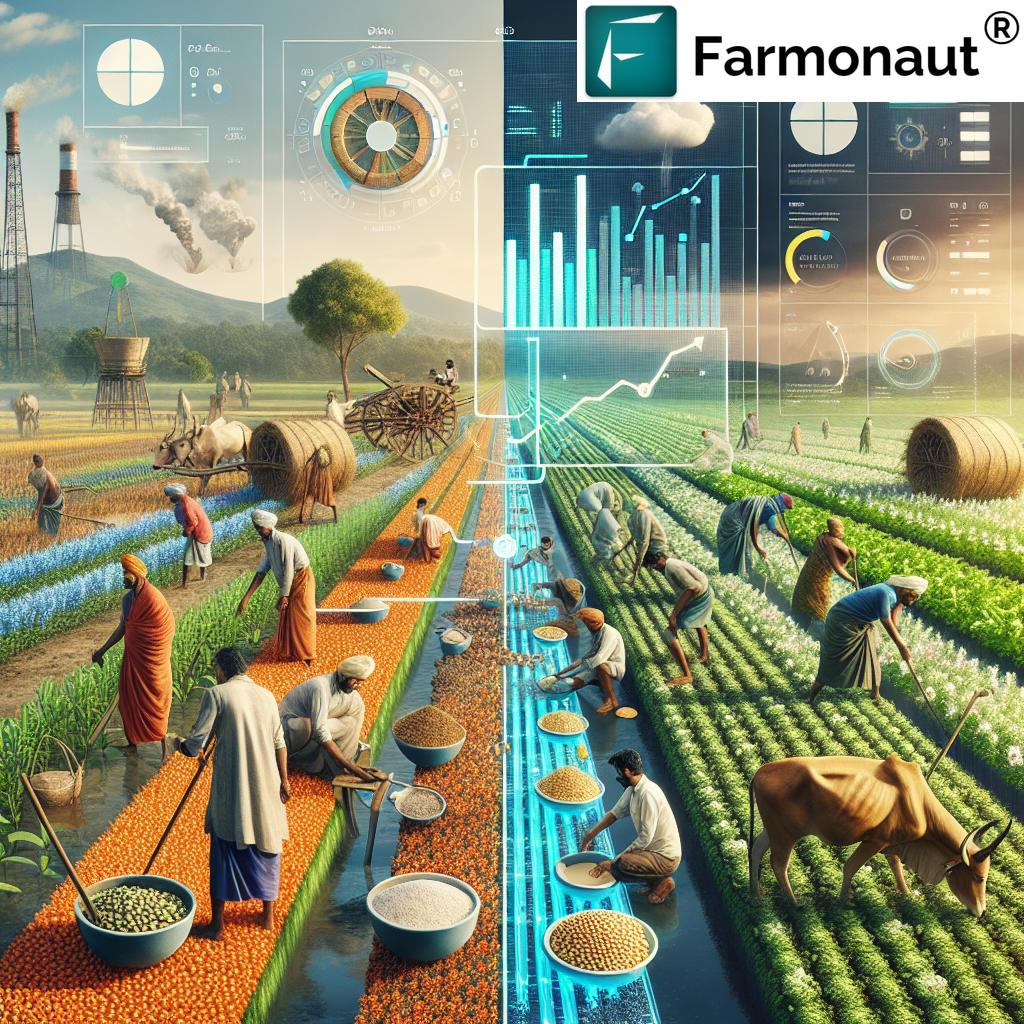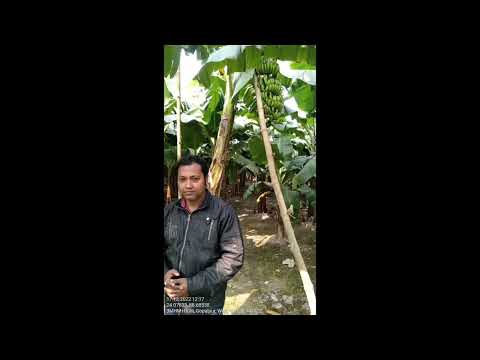NFSM 2024: Boosting Sustainable Agriculture with GIS Technology for Food Security in India
In the heart of India’s agricultural landscape, a revolutionary initiative is taking root, promising to transform the way we approach food security and sustainable farming. The National Food Security Mission (NFSM) 2024 stands as a beacon of hope, harnessing the power of cutting-edge technology and time-honored agricultural wisdom to ensure a bountiful future for our nation. As we delve into this comprehensive program, we’ll explore how NFSM is leveraging GIS technology, precision agriculture, and sustainable practices to boost crop yields, enhance food production, and secure India’s nutritional sovereignty.

“NFSM focuses on 4 key crops: rice, wheat, pulses, and oilseeds to enhance India’s food security.”
Understanding the National Food Security Mission
The National Food Security Mission (NFSM) is a centrally sponsored scheme that aims to increase the production of rice, wheat, pulses, coarse cereals, and nutri cereals through area expansion and productivity enhancement. Launched in 2007, NFSM has evolved to address the changing needs of India’s agricultural sector, with the 2024 iteration focusing on sustainable practices and technological integration.
Key Objectives of NFSM 2024
- Increase production of rice, wheat, pulses, coarse cereals, and nutri cereals
- Enhance soil fertility and productivity
- Restore soil fertility and productivity of individual farms
- Create employment opportunities
- Enhance farm-level economy to restore confidence among farmers
The mission’s approach is holistic, integrating various aspects of agricultural development to create a sustainable and resilient food production system. By focusing on these objectives, NFSM 2024 aims to secure India’s food future while improving the livelihoods of millions of farmers across the country.
GIS Technology: The Cornerstone of Precision Agriculture
At the heart of NFSM 2024’s technological arsenal is Geographic Information System (GIS) technology. This powerful tool is revolutionizing the way we approach agriculture, offering unprecedented insights into crop health, soil conditions, and resource management.
The Krishi Mapper Portal
“The Krishi Mapper portal, utilizing GIS technology, helps optimize crop yields across India’s diverse agricultural landscape.”
One of the most innovative aspects of NFSM 2024 is the Krishi Mapper portal. This GIS-based platform serves as a central hub for agricultural data, allowing farmers, researchers, and policymakers to access critical information for decision-making. The Krishi Mapper portal offers:
- Real-time crop monitoring
- Soil health mapping
- Weather forecasting integration
- Yield prediction models
By leveraging these features, farmers can make informed decisions about planting times, irrigation schedules, and fertilizer application, leading to optimized crop yields and reduced resource wastage.
Sustainable Agriculture Practices Under NFSM 2024
NFSM 2024 places a strong emphasis on sustainable agriculture practices, recognizing the need to balance productivity with environmental stewardship. Let’s explore some of the key initiatives:
| Initiative | Description | Target Crops | GIS Technology Application |
|---|---|---|---|
| Precision Agriculture | Utilizes data-driven insights for optimized farming practices | Rice, Wheat, Pulses, Oilseeds | Crop monitoring, yield prediction, resource allocation |
| Climate-Resilient Farming | Implements strategies to adapt to changing climate conditions | All NFSM crops | Weather pattern analysis, crop suitability mapping |
| Seed Distribution Management | Ensures timely and efficient distribution of high-quality seeds | Rice, Wheat, Pulses, Oilseeds | Supply chain tracking, demand forecasting |
| Farmer Training Programs | Educates farmers on modern sustainable farming techniques | All NFSM crops | E-learning platforms, virtual field demonstrations |
Crop Yield Optimization
One of the primary goals of NFSM 2024 is to optimize crop yields through a combination of traditional knowledge and modern technology. This approach includes:
- Improved seed varieties resistant to pests and diseases
- Precision irrigation techniques to conserve water
- Integrated pest management to reduce chemical usage
- Soil health management through organic inputs
By implementing these strategies, NFSM aims to increase the productivity of key crops while maintaining soil health and biodiversity.
Climate-Resilient Farming
As climate change poses increasing challenges to agriculture, NFSM 2024 is prioritizing climate-resilient farming practices. These include:
- Developing drought-tolerant crop varieties
- Promoting water conservation techniques
- Encouraging agroforestry and intercropping
- Implementing early warning systems for extreme weather events
These measures not only help farmers adapt to changing climatic conditions but also contribute to the overall sustainability of India’s agricultural sector.

Focus on Essential Crops
NFSM 2024 places special emphasis on key crops that form the backbone of India’s food security. Let’s explore the strategies for each:
Rice
As a staple food for a large portion of India’s population, rice is a critical focus of NFSM. The mission aims to:
- Introduce high-yielding, water-efficient varieties
- Promote System of Rice Intensification (SRI) for increased productivity
- Implement direct seeded rice technology to reduce water usage
Wheat
Wheat is another crucial crop under NFSM, with strategies including:
- Developing heat-tolerant varieties for changing climate conditions
- Encouraging zero-tillage techniques for soil conservation
- Promoting balanced fertilizer use through soil health cards
Pulses
Recognizing the importance of pulses in nutrition and soil health, NFSM 2024 focuses on:
- Expanding area under pulse cultivation
- Introducing short-duration varieties for crop diversification
- Promoting intercropping of pulses with cereals and oilseeds
Oilseeds
To reduce dependence on imported edible oils, NFSM 2024 emphasizes oilseed production through:
- Area expansion under oilseed cultivation
- Introducing high-oil content varieties
- Improving post-harvest management and processing facilities
Leveraging Technology for Agricultural Productivity
NFSM 2024 recognizes the transformative power of technology in agriculture. In addition to GIS, the mission is incorporating various technological solutions to boost productivity and sustainability:
Artificial Intelligence and Machine Learning
AI and ML algorithms are being deployed to:
- Predict pest and disease outbreaks
- Optimize crop rotation schedules
- Provide personalized crop advisory services
Internet of Things (IoT) in Agriculture
IoT devices are revolutionizing farm management through:
- Smart irrigation systems
- Soil moisture sensors
- Automated climate control in greenhouses
Drone Technology
Drones are being utilized for:
- Crop spraying and seeding
- High-resolution field mapping
- Monitoring crop health and growth patterns
These technological advancements are not only improving efficiency but also making agriculture more attractive to younger generations, ensuring the long-term sustainability of the sector.
Seed Distribution Management
A critical component of NFSM 2024 is the efficient management of seed distribution. The mission aims to:
- Ensure timely availability of high-quality seeds
- Promote the use of certified and truthfully labeled seeds
- Establish seed hubs for pulses and oilseeds
- Encourage farmer-to-farmer seed exchange programs
By improving seed distribution, NFSM 2024 lays the foundation for increased productivity and crop quality across India.
Farmer Training and Capacity Building
NFSM 2024 recognizes that technology alone is not enough; farmers need the knowledge and skills to implement new practices effectively. The mission includes comprehensive training programs focusing on:
- Modern farming techniques and technologies
- Sustainable agriculture practices
- Climate-smart agriculture
- Post-harvest management and value addition
These training programs are delivered through various channels, including:
- Farmer Field Schools
- Demonstration plots
- Mobile apps and e-learning platforms
- Farmer-to-farmer knowledge sharing networks
Monitoring and Evaluation
To ensure the success of NFSM 2024, a robust monitoring and evaluation system has been put in place. This includes:
- Real-time progress tracking through MIS (Management Information System)
- Regular field visits and inspections
- Third-party evaluations
- Impact assessment studies
This comprehensive approach allows for timely interventions and policy adjustments, ensuring that the mission remains on track to achieve its objectives.
The Role of Farmonaut in Supporting NFSM 2024
As we explore the technological advancements driving NFSM 2024, it’s worth highlighting the contributions of innovative companies like Farmonaut. While not directly affiliated with the mission, Farmonaut’s cutting-edge agritech solutions align closely with NFSM’s goals of enhancing agricultural productivity and sustainability.
Farmonaut offers advanced, satellite-based farm management solutions that complement the objectives of NFSM 2024. Their platform provides:
- Real-time crop health monitoring
- AI-based advisory systems
- Resource management tools
These technologies can significantly contribute to the precision agriculture goals of NFSM 2024, helping farmers make data-driven decisions to optimize their crop yields and resource usage.
Explore Farmonaut’s solutions:
For developers interested in integrating agricultural data into their applications:
Mobile apps for on-the-go farm management:
Challenges and Future Outlook
While NFSM 2024 presents a promising path forward for India’s agricultural sector, it’s important to acknowledge the challenges that lie ahead:
- Ensuring widespread adoption of new technologies among small and marginal farmers
- Addressing infrastructure gaps in rural areas
- Balancing increased production with environmental sustainability
- Adapting to rapidly changing climate conditions
Despite these challenges, the future outlook for Indian agriculture under NFSM 2024 is optimistic. By combining traditional wisdom with modern technology, the mission has the potential to transform India’s agricultural landscape, ensuring food security for generations to come.
Conclusion
The National Food Security Mission 2024 represents a bold step towards a more sustainable, productive, and resilient agricultural future for India. By leveraging GIS technology, promoting sustainable practices, and focusing on key crops, NFSM 2024 is paving the way for a food-secure nation. As we move forward, the success of this mission will depend on the collective efforts of farmers, researchers, policymakers, and innovative companies working together towards a common goal.
Through initiatives like NFSM 2024 and the support of advanced agricultural technologies, India is well-positioned to meet the food security challenges of the 21st century while ensuring the prosperity of its farming communities.
FAQ Section
Q: What is the main goal of NFSM 2024?
A: The main goal of NFSM 2024 is to increase the production of key crops like rice, wheat, pulses, and oilseeds through sustainable agriculture practices and advanced technologies, ultimately ensuring food security for India.
Q: How does GIS technology contribute to NFSM 2024?
A: GIS technology plays a crucial role in NFSM 2024 by enabling precision agriculture, providing real-time crop monitoring, soil health mapping, and yield prediction, which helps farmers make informed decisions and optimize their agricultural practices.
Q: What are some sustainable agriculture practices promoted by NFSM 2024?
A: NFSM 2024 promotes practices such as integrated pest management, precision irrigation, crop diversification, and the use of organic inputs to enhance soil health and reduce environmental impact.
Q: How does NFSM 2024 address climate change challenges?
A: The mission focuses on developing climate-resilient farming techniques, introducing drought-tolerant crop varieties, and implementing early warning systems for extreme weather events to help farmers adapt to changing climate conditions.
Q: What role do farmers play in the success of NFSM 2024?
A: Farmers are key to the success of NFSM 2024. They are encouraged to adopt new technologies, participate in training programs, and implement sustainable farming practices to increase productivity and ensure the long-term viability of Indian agriculture.






